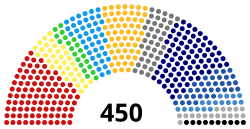3rd State Duma
at the 3rd convocation | |||||
|---|---|---|---|---|---|
| |||||
 Seat composition of the 3rd State Duma | |||||
| Overview | |||||
| Meeting place | State Duma Building Moscow, 1 Okhotny Ryad street | ||||
| Term | 19 December 1999 – 7 December 2003 | ||||
| Election | 1999 parliamentary election | ||||
| Government | 28 committees | ||||
| Website | State Duma | ||||
| Members | 441 / 450
| ||||
| Chairman | Gennadiy Seleznyov (from Communist Party) | ||||
| Party control | 1st coalition: Unity and Communist Party 2nd coalition: Unity and Fatherland – All Russia | ||||


The State Duma of the Federal Assembly of the Russian Federation, the 3rd convocation (Russian: Государственная Дума Федерального Собрания Российской Федерации III созыва) was the third session of the legislative branch of the State Duma, Lower House of the Russian Parliament. The 3rd convocation met at the State Duma building in Moscow from December 19, 1999 to December 7, 2003.
Leadership

Until the election of the Chairman of the State Duma of the meeting, the position was filled by the oldest deputy – 79 year-old of Yegor Ligachyov – according to traditions.
On January 18, 2000, the parliament elected Gennadiy Seleznyov as the Chairman of the State Duma.[1]
Factions

Coalitions
In the State Duma at the 3rd convocation, two coalitions functioned at different times as the majority. In both cases, the coalitions were initiated by the "Unity" faction.
The first coalition was formed immediately after the announcement of election results, during the preparations for the first meeting of the new parliament. The "Unity" faction and the Communist Party (the largest in the State Duma) signed a package agreement, according to which they shared the top positions of the Duma and the chairmanships of parliamentary committees. As for "Unity" it was mainly to keep the levers of control of the State Duma from its main competitors at that time - "Fatherland-All Russia". The Communists made an agreement on favorable terms.
During the session, the parliament consolidated pro-government forces around President Vladimir Putin: the merger of public movements "Unity" and "Fatherland" was announced,[2] which led to corresponding changes in the State Duma. In April 2002, the newly formed majority of the State Duma cleaned house and deprived the Communists of the benefits they received at the beginning. They were deprived of the majority of management positions. This caused a crisis within the Communist Party faction - Chairman of the State Duma Gennady Seleznyov, as well as heads of two committees (Svetlana Goryacheva and Nikolai Gubenko) chose to leave the faction, and to keep their positions.[3]
Major legislation
- May 17, 2000: Mikhail Kasyanov was approved as Prime Minister of Russia with 325 votes in favor.[4]
- May 14, 2003: Ratification of the Russian-American Strategic Offensive Reductions Treaty with 294 votes in favor.[5]
Committees
28 committees operated in the State Duma at the 3rd convocation.
- Law Committee
- Veterans Affairs Committee
- Committee of Labour and Social Policy
- Budget and Tax Committee
- Committee on Credit Organizations and Financial Markets
- Committee on Economic Policy and Entrepreneurship
- Committee on Property Issues
- Information Policy Committee
- Committee on Energy, Transport and Communications
- Committee on Industry, Construction and High Technology
- Education and Science Committee
- Culture and Tourism Committee
- Health and Sports Protection Committee
- Health Protection Committee
- Committee on Women, Family and Children
- Committee on Agrarian Issues
- Defence Committee
- Safety Committee
- Committee on International Affairs
- Committee on Commonwealth of Independent States Affairs and Relations with Compatriots
- Committee on Rules and Organization of the State Duma
- Committee on the problems of the North and Far East
- Committee on Federation Affairs and Regional Policy
- Committee on Local Government
- The Environmental Committee
- Committee on Natural Resources and the Environment
- Committee on Public Associations and Religious Organizations
- Committee for Nationalities
References
- ^ Resolution of the State Duma of the Federal Assembly of the Russian Federation from 18.01.2000 number 6-III GD
- ^ In Moscow, the party "Unity" and "Fatherland" was founded
- ^ On the expulsion of the Communist Party G. Seleznev, S. and N. Goryacheva Hubenko
- ^ In Russia, the new Prime Minister
- ^ The State Duma ratified the agreement with the SNP on the America
